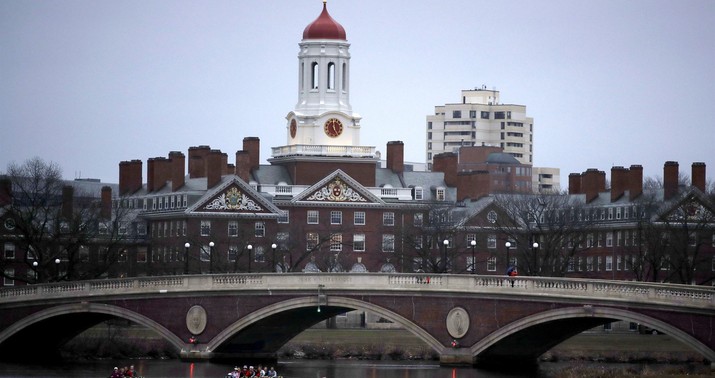Earlier this month a judge determined that Harvard’s admissions practices did not discriminate against Asian applicants. The lawsuit which led to that decision was filed by a group called Students for Fair Admissions. SFFA hired an expert who looked closely at Harvard’s process and discovered something curious. While Asian students score the highest of any group on academics and extra-curricular activities, they score consistently lower than other groups on Harvard’s personality score.
The lead attorney who worked on the lawsuit, Adam K. Mortara, was invited to speak about the decision at Harvard last week. He argued that the judge had made a series of errors in the case and that Harvard is running a de facto quota system:
During his speech, Mortara alleged that Harvard runs a “thinly disguised quota system”; the Supreme Court has ruled that racial quotas in admissions processes are illegal. He pointed to past statistics for admissions rates by race, arguing that they showed “remarkable stability” and did not change drastically until SFFA sued Harvard. At that point, Mortara argued, the number of admits increased.
More than 25 percent of admitted students to the Class of 2023 were Asian American. In comparison, in the Class of 2018 — the last class admitted before SFFA sued Harvard in late 2014 — 19.7 percent of admitted students were Asian American.
“Stability over 10 years and a remarkable increase by nearly 30 percent in the number of Asian Americans on campus after they got sued — what does that prove? It proves they have control,” Mortara said.
Later in the same speech, Mortara pointed to the discrepancy in personality scores and mocked the idea that black and Hispanic students were “more personally appealing.” It was at this point that a dozen students shouted back their agreement with that idea:
Mortara also challenged Burroughs’ tacit acceptance of the discrepancy in personal ratings as insufficient evidence of discrimination.
“No one — not Judge Burroughs, not Harvard — has ever explained how it is that African Americans and Hispanics just have much better objective personal qualities than white and Asian applicants,” he said. “They’ve never done it.”
“I guess there’s just something more personally appealing about African American and Hispanic applicants,” Mortara quipped. In response, at least a dozen students in the crowd voiced their agreement, shouting, “There is!”
No doubt the students were not saying this in earnest. Nevertheless, their outburst suggests racial discrimination isn’t always taken seriously by Harvard students, at least not so long as they believe it’s benefitting the right groups. To clarify what the lawsuit alleged, here’s a brief summary of the findings regarding Asian personality scores from a NY Times piece:
Harvard evaluated applicants on the extent to which they possessed the following traits: likability, helpfulness, courage, kindness, positive personality, people like to be around them, the person is widely respected. Asian-Americans, who had the highest scores in both the academic and extracurricular ratings, lagged far behind all other racial groups in the degree to which they received high ratings on the personality score.
“Asian-American applicants receive a 2 or better on the personal score more than 20% of the time only in the top academic index decile. By contrast, white applicants receive a 2 or better on the personal score more than 20% of the time in the top six deciles,” wrote Mr. Arcidiacono. “Hispanics receive such personal scores more than 20% of the time in the top seven deciles, and African Americans receive such scores more than 20% of the time in the top eight deciles.”…
Mr. Arcidiacono found that an otherwise identical applicant bearing an Asian-American male identity with a 25 percent chance of admission would have a 32 percent chance of admission if he were white, a 77 percent chance of admission if he were Hispanic, and a 95 percent chance of admission if he were black.
In her decision, Judge Allison D. Burroughs concluded that there was evidence of a negative relationship between being Asian and personality scores (Harvard didn’t dispute it) but went on to say that that may not be the result of racial bias. Her evidence that it was not? Harvard’s staff denied it:
Harvard s witnesses credibly testified that they did not use race in assigning personal ratings (or any of the profile ratings) and did not observe any improper discrimination in the admissions process. The uniformity of these observations is persuasive given the collective manner in which admissions decisions are made, with all members of the Admissions Committee participating in all decisions and having real-time visibility into the process for each applicant. Any causal relationship between Asian American identity and the personal rating must, therefore, have been sufficiently subtle to go unnoticed by numerous considerate, diligent, and intelligent admissions officers who were immersed in the admissions process.
The idea that there can’t be racism if everyone denies it seems to cut against the entire grain of the left’s intersectional viewpoint but Judge Burroughs appears to be an old-school liberal who still believes the goal of diversity is creating a color-bling society. In her conclusion she wrote:
The students who are admitted to Harvard and choose to attend will live and learn surrounded by all sorts of people, with all sorts of experiences, beliefs and talents. They will have the opportunity to know and understand one another beyond race, as whole individuals with unique histories and experiences. It is this, at Harvard and elsewhere that will move us, one day, to the point where we see that race is a fact, but not the defining fact and not the fact that tells us what is important, but we are not yet.
The case has already been appealed and will likely wind up at the Supreme Court where several of the Justices will likely be less willing to wink at Harvard’s system of discrimination.
